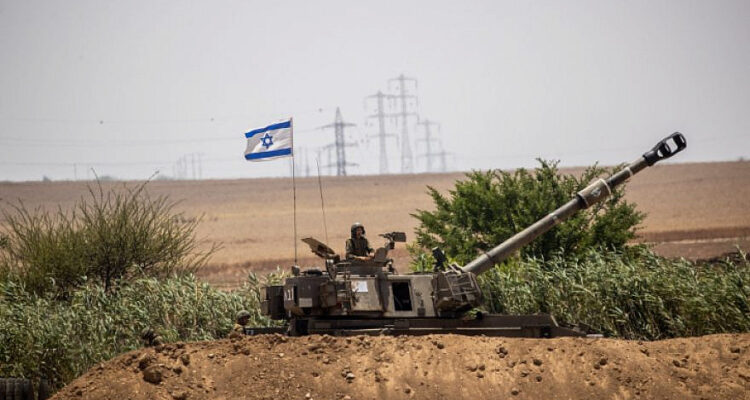The ‘humanitarian bubbles’ concept is part of a broader three-tier postwar plan championed by the Israeli security establishment and Israeli Defense Minister Yoav Gallant.
By Erez Linn, JNS
The Israeli army is set to launch a contentious pilot program for governing post-war Gaza, The Financial Times reported on Monday.
The project involves creating a number of humanitarian “enclaves” or “bubbles” free of Hamas control, but has reportedly been met with widespread skepticism by those briefed on the details.
The experimental model is slated to be implemented soon in the northern Gaza neighborhoods of Al-Atatra, Beit Hanoun and Beit Lahia, according to the Financial Times, citing six sources familiar with the plan.
As part of the scheme, the Israeli military would channel aid from the nearby Erez Crossing to vetted locals, who would distribute it and gradually assume civilian governance responsibilities. Israeli forces would initially ensure security in these areas.
However, the plan is said to face significant challenges.
One source described it to the Financial Times as a “fantasy” project, citing violent opposition from Hamas, infighting within Israeli Prime Minister Benjamin Netanyahu’s coalition, and a lack of support from Arab states.
The initiative comes after months of international pressure on Jerusalem to formulate a viable alternative for the “day after” Hamas.
However, two individuals briefed on the plan told the Financial Times that the proposal appears to be a rehash of previous unsuccessful attempts.
“We already tried this in three different parts of central and north Gaza, including with local clans. They were all either beaten up or killed by Hamas,” said a former Israeli official familiar with postwar planning.
Recent events underscore the dangers faced by those perceived as cooperating with the Jewish state.
Last week, deadly clashes erupted between Hamas terrorists and a prominent clan in central Gaza after Hamas executed the head of the Abu Amra family over alleged “receptivity” to Israeli overtures, according to a Gaza source.
Hamas has vehemently rejected any role for the Israel Defense Forces in Gaza’s future.
Last week, the terror group declared it would “sever any hand of the occupation trying to tamper with the destiny and future of our people.”
The plan faces additional hurdles due to Netanyahu’s rejection of any role for the Palestinian Authority in Gaza and refusal to consider a pathway to Palestinian statehood, according to the report.
Despite this stance, Netanyahu and his aides insist that Arab nations will play a major role after the conflict.
Israeli National Security Adviser Tzachi Hanegbi last week called for the new leadership to include Arab nations that are part of the Abraham Accords, along with the United States, the United Nations, and the European Union.
“The idea is, and this is what the Americans agree on, including in the conversations this week and also in the conversation that the minister of defense is conducting right now [in Washington], is that there will be a so-called top-down leadership, and not only bottom-up,” he stated.
The Cabinet has authorized the Israel Defense Forces to lead the process of finding an alternative to Hamas, he stated, adding that the plan will be launched first in Gaza’s north and is set to be implemented “soon.”
However, Arab officials have rebuffed such proposals without the involvement of the P.A. and concrete progress toward a Palestinian state.
“Arab states will not support reconstruction in Gaza or postwar plans unless Israel takes concrete steps towards the establishment of a Palestinian state,” an Arab diplomat told the Financial Times.
The “humanitarian bubbles” concept is part of a broader three-tier postwar plan championed by the Israeli security establishment and Israeli Defense Minister Yoav Gallant.
The scheme envisions an international coalition providing diplomatic and financial support, with P.A. officials and local leaders managing a new regime and the “bubbles” being run by representatives of various stakeholders.
Plans are also underway to train a local Palestinian security force from within Gaza, with candidates to be vetted by Majed Faraj, Ramallah’s intelligence chief.
However, resistance from top levels of the Netanyahu government has reportedly stalled progress on the comprehensive plan.
Many observers remain doubtful of the experimental model’s success.
“If you try to experiment just on the lower level, it won’t work. Nobody will put money into this without a long-term comprehensive plan. There are no buyers,” the former Israeli official told the Financial Times.
U.S. Secretary of State Antony Blinken told a panel on Wednesday that the Biden administration has yet to see enough information about Jerusalem’s plans for Gazan reconstruction.
“We’ve told the Israelis that we expect them to develop their own plans, their own ideas,” Blinken stated. “We’ve not seen enough of that from Israel.”
Blinken said that Washington remains “determined not to be outpaced” and has been working with its Arab allies since January on plans for what to do if Hamas accepts a ceasefire-for-hostages deal with Israel.




